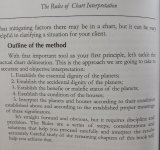I'm just starting to learn about astrology and read "The Art of Chart Interpretation" by Tracy Marks, which should simplify things, but I'm still confused. In my own natal chart the moon is on the east side all alone and it has the most aspects with other planets *however* it's in Scorpio, so very weak. On the west side Mercury is in it's own sign - Gemini, and is also my final depositor *however* it's in combust with the Sun, also in Gemini, so very weak. My ascendant is in Scorpio and it's ruling planet, Mars, is right at the top of the chart on the MC. Do I count Mars as the most important? Or learn about this with someone else's natal chart that's easier to interpret?

Tracey Marks used to be the book that I most relied on when I struggled with Modern Astrology. I found her (and Stephen Arroyo) to be the most 'sensible' sources. So if you're just beginning to learn, she is indeed a good start.
However, the book was written in (I believe) 1986, long before the rediscovery traditional Astrology got underway in earnest. She's not a source I use now.
Without sight of your chart I can only offer a number of observations.
Tracey is right to suggest that the Moon in Scorpio is 'weak'. Scorpio is the sign of the Moon's 'Fall'. However we now know that the original interpretation of 'Fall' wasn't so much a signification of inability to 'act' but a signification of a propensity to act 'oddly' (in terms of the planet's general signifcation). The number of aspects is not really relevant, its the quality of the aspects that matters. Do the aspects support or hinder the actions signified by the planet? Traditionally aspects from Venus or Jupiter (especially trines and sextiles) were seen as beneficial. Aspects from Mars and Saturn were seen as 'malefic' or not beneficial might be a better modern term. There are other aspects from planets that might help or hinder, that are derived from their roles in your chart but clearly I can't comment there.
Moon in the East is very good, if she is in the first house, not as good if she's in the second and not good at all if she's in the twelfth. If you use whole sign houses, as I'm trying to do, the Moon would be in the first and so very well placed. How that combines with the aspects, I don't know without a chart.
Mercury in Gemini is good and actually will resist the combustion. Hellenistic Astrologers had a doctrine of 'being in it's own chariot'. A chariot was a covered vehicle and so Mercury had it's own sun shade, so to speak. That idea seemed that idea seemed to have got lost in the middle ages. So your Mercury is stronger than you think.
Final dispositorship is a concept tried out in the last quarter of the twentieth century. It really has no roots in the tradition, though it does make use of the traditional concept of rulership.
With your Ascendant in Scorpio, the Sun is in the eighth house (using whole sign houses), which isn't good but then on it's own that's not a major problem.
Mars on the MC, is good because it's angular. It might not be so good if it's in Cancer, the sign of it's Fall - Mars being eccentric is not ideal, especially if it's in an important place.
Finding the strongest planet in your chart is not easy, most methods are rather complex and as there are several methods available, there's not a unique answer at the end of the process - though I have found that usually there's rough agreement on ranking of planets.
Establishing what used to be called the Lord of the Nativity, is not necessarily the best first move in interpretation. But looking for contenders, as you are doing, is a good move. Planets that are angular or in Succedent houses general are better than those in cadent houses. Planets in houses that aspect the Ascendant are better than planets in houses that don't (Whole Sign Houses help on this one). Planets in their own signs, exaltations or triplicities are better than those which aren't. There are two other levels of essential dignity that were used but you have enough to start with there.
Other factors you might consider is whether the planet is retrograde or not, whether it is fast or not, and where it is in relation to the Sun. Most of us are aware that waxing Moons are stronger than waning Moons. Your Moon is waxing and approaching Full Moon (which will be in Sagittarius, unless the Sun is in the very last degree of Gemini).
A similar idea applies to the other planets, and was referred to as being oriental (rising before the Sun) or occidental (setting after the Sun). Again this is something for later consideration but for now just be aware that it's a method of beginning to refine your basic findings.
Have you got any software yet? Having your own software is a very great help because you can change so many of the 'settings' to see the effects on your chart. The best freebie is Morinus, now in version 8.


 Anyway, Marie-Bernard, maybe these could be other books for you to investigate?
Anyway, Marie-Bernard, maybe these could be other books for you to investigate?
